|
|
|
Sort Order |
|
|
|
Items / Page
|
|
|
|
|
|
|
| Srl | Item |
| 1 |
ID:
151833
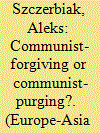

|
|
|
|
|
| Summary/Abstract |
While Poles generally supported a radical approach towards truth revelation, on its own the issue did not appear to be especially salient. Poles wanted to move on from debates about the communist past and felt that the process of achieving transitional justice was a potentially destructive one. However, they also felt that they had a right to know about the past of their political elites and that collaboration with the communist security services was an especially reprehensible form of pro-regime activity. Moreover, in the public mind truth revelation was often considered in conjunction with other, more salient issues.
|
|
|
|
|
|
|
|
|
|
|
|
|
|
|
|
| 2 |
ID:
168664


|
|
|
|
|
| Summary/Abstract |
Energy storage technologies are receiving increasing attention in the UK and around the world as a means of increasing penetration of inflexible low-carbon electricity generation and optimising investment in energy infrastructure required to meet international decarbonisation goals. Research into the social acceptability of energy infrastructure has compellingly illustrated the importance of societal perceptions in the successful deployment of new infrastructure. However to date, no study has empirically examined public perceptions across the broad range of storage technologies available. We address this gap by presenting qualitative findings from four deliberative workshops held with members of the British public. We show that citizens underestimate the challenge of growing volumes of inflexible low-carbon electricity generation, and respond to storage technologies through reference to commonly perceived risks and benefits. When participants discussed how storage might be funded and managed, additional evaluative criteria emerged centred around equity, vulnerability, independence and convenience. Our findings suggest that perceptions of storage technologies tend to be ambivalent, and that acceptance is likely to be contingent on whether storage technologies can be designed, regulated and governed in ways which reduce technical concerns over safety, environmental impacts and reliability, while meeting societal desires for equity and the protection of vulnerable groups.
|
|
|
|
|
|
|
|
|
|
|
|
|
|
|
|
| 3 |
ID:
189005


|
|
|
|
|
| Summary/Abstract |
This article presents findings of an original survey experiment on public attitudes toward nuclear use conducted on a representative sample of Russian citizens. We randomly assigned our participants to experimental treatments with vignettes describing a military conflict between Russia and NATO in the Baltics, where Moscow considered a limited nuclear “escalate-to-deescalate” strike to avert defeat. Our findings show that Russians are significantly more averse to nuclear strikes than to the corresponding use of conventional missiles. The participants disapproved similarly of a demonstrative nuclear explosion in an unpopulated area and of nuclear strikes in a more escalated scenario. We also found associations between the moral values of individuals and strike support corresponding to earlier studies in the United States. Finally, our participants reported similar concerns about both nuclear and conventional strikes, with the worry about civilian casualties and the suffering of victims at the top of the list across experimental treatments.
|
|
|
|
|
|
|
|
|
|
|
|
|
|
|
|
| 4 |
ID:
148780


|
|
|
|
|
| Summary/Abstract |
The granting of amnesties has now become a cornerstone of peacebuilding efforts in societies emerging from conflict. Yet, the impact of the role of religion and ethnicity in determining attitudes towards such arrangements has not been empirically assessed. Mindful of this omission, this article investigates the relationship between a range of religious measures — religious practices and beliefs in and about God — and ethnonationalist identity on public attitudes toward amnesty in Northern Ireland. Based on nationally representative survey data, the results suggest that, although Protestants are significantly more opposed to such an initiative than Catholics, both religious beliefs and ethnonational identity are significant, albeit divergent, net predictors with respect to their differing views.
|
|
|
|
|
|
|
|
|
|
|
|
|
|
|
|
| 5 |
ID:
117994
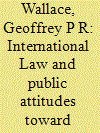

|
|
|
|
|
| Publication |
2013.
|
| Summary/Abstract |
Domestic approaches to compliance with international commitments often presume that international law has a distinct effect on the beliefs and preferences of national publics. Studies attempting to estimate the consequences of international law unfortunately face a wide range of empirical and methodological challenges. This article uses an experimental design embedded in two U.S. national surveys to offer direct systematic evidence of international law's effect on mass attitudes. To provide a relatively tough test for international law, the surveys examine public attitudes toward the use of torture, an issue in which national security concerns are often considered paramount. Contrary to the common contention of international law's inefficacy, I find that legal commitments have a discernible impact on public support for the use of torture. The effect of international law is also strongest in those contexts where pressures to resort to torture are at their highest. However, the effects of different dimensions in the level of international agreements' legalization are far from uniform. In contrast to the attention often devoted to binding rules, I find that the level of obligation seems to make little difference on public attitudes toward torture. Rather, the relative precision of the rules, along with the degree to which enforcement is delegated to third parties, plays a much greater role in shaping public preferences. Across both international law and legalization, an individual's political ideology also exerts a strong mediating effect, though in varying directions depending on the design of the agreement. The findings have implications for understanding the overall impact of international law on domestic actors, the importance of institutional design, and the role of political ideology on compliance with international agreements.
|
|
|
|
|
|
|
|
|
|
|
|
|
|
|
|
| 6 |
ID:
154163


|
|
|
|
|
| Summary/Abstract |
China's booming economy has provided various opportunities for international immigration, but current studies lack a focus on public attitudes towards immigration in China. Using a nationwide representative survey carried out in China, this article finds that most Chinese have positive attitudes towards international immigration, foreign workers and foreign spouses. This study also learns that more respondents believe that immigration should increase rather than decrease. In seeking the sources of these attitudes, this article identifies that non-economic factors play a significant role, and that both cultural tolerance and perceived threat are important sources of attitudes towards immigration.
|
|
|
|
|
|
|
|
|
|
|
|
|
|
|
|
| 7 |
ID:
097763
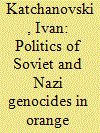

|
|
|
|
|
| Publication |
2010.
|
| Summary/Abstract |
This article examines policies and public attitudes concerning the issue of Soviet and Nazi genocides in Ukraine after the 'Orange Revolution'. The central question is whether such factors as regional political culture affect contemporary policies and public attitudes towards these important historical issues. The article uses a 2008 survey conducted for this study by the Kyiv International Institute of Sociology to analyse determinants of public attitudes concerning the question of whether Soviet and the Nazi policies were genocidal. It finds that regional political culture is the most significant factor affecting policies and attitudes towards the Soviet genocide in Ukraine.
|
|
|
|
|
|
|
|
|
|
|
|
|
|
|
|
| 8 |
ID:
087755
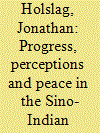

|
|
|
|
|
| Publication |
2009.
|
| Summary/Abstract |
The Chinese and Indian government are eager to intensify bilateral ties. This paper evaluates whether this enthusiasm has positively affected perceptions of the two societies in general, political actors and experts. A review of opinion polls, publications and official documents learned that this is not the case. Mutual perceptions are marked with ambivalence and distrust.
|
|
|
|
|
|
|
|
|
|
|
|
|
|
|
|
| 9 |
ID:
125830
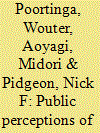

|
|
|
|
|
| Publication |
2013.
|
| Summary/Abstract |
The threats posed by climate change call for strong action from the international community to limit carbon emissions. Before the Fukushima accident that followed the Great East Japan earthquake and tsunami on 11 March 2011, both Britain and Japan were considering an ambitious expansion of nuclear power as part of their strategy to reduce carbon emissions. However, the accident may have thrown nuclear power as a publicly accep' energy technology into doubt. This study uses several nationally representative surveys from before and after the Fukushima accident to examine how it may have changed public perceptions of climate change and energy futures in Britain and Japan. The study found that already before the accident the Japanese public were less supportive of nuclear power than the British. While British attitudes have remained remarkably stable over time, the Japanese public appear to have completely lost trust in nuclear safety and regulation, and have become less acceptive of nuclear power even if it would contribute to climate change mitigation or energy security. In Japan the public are now less likely to think that any specific energy source will contribute to a reliable and secure supply of energy. The implications for energy policy are discussed.
|
|
|
|
|
|
|
|
|
|
|
|
|
|
|
|
| 10 |
ID:
108281


|
|
|
| 11 |
ID:
156421
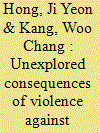

|
|
|
|
|
| Summary/Abstract |
In this paper, we examine the extent to which wartime violence against civilians during the Korean War affects people's current attitudes toward South Korea and other involved countries. Using a difference-in-differences (DID) approach that compares the cohorts born before and after the war, we find that direct exposure to wartime violence induces negative perceptions regarding perpetrator countries. As many of the civilian massacres were committed by the South Korean armed forces, prewar cohorts living in violence-ridden areas during the war demonstrate significantly less pride in South Korea today. In contrast, postwar cohorts from those violent areas, who were exposed to intensive anti-communist campaigns and were incentivized to differentiate themselves from the victims, show significantly greater pride in South Korea, and greater hospitality toward the United States than toward North Korea, compared to prewar cohorts in the same areas and to the same cohorts born in non-violent areas.
|
|
|
|
|
|
|
|
|
|
|
|
|
|
|
|
| 12 |
ID:
164559


|
|
|
|
|
| Summary/Abstract |
How do individuals’ personal experiences with various aspects of political violence affect their attitudes toward hosting conflict refugees? More specifically, how do their personal exposure to violence, their own personal experience of being displaced, and their recent contact with refugees influence these attitudes? To explore answers to these questions, we draw upon a recent survey of 2,400 Lebanese residents where we identify individuals who experienced violence during the Lebanese civil war (1975–90), those forced to flee their homes during that conflict, and those who enjoy recent contact with Syrian immigrant and/or displaced populations. We examine whether these distinct experiences affect respondents’ regard for members of the Syrian refugee population. Results demonstrate that historical exposure to violence and experience of displacement have no discernible impact on individual attitudes toward hosting refugees. We find much stronger evidence that attitudes are associated with whether individual respondents have had contact with Syrians in Lebanon; those with such interactions are significantly more likely to support hosting refugees, to consider hiring a refugee, or to allow one of their children to marry a refugee. Our findings suggest exposure to violence by itself does not correlate to positive sentiments toward refugees, especially over time. Further, finding ways to create positive contact between refugees and native populations may be associated with improving attitudes and relations between the two populations.
|
|
|
|
|
|
|
|
|
|
|
|
|
|
|
|
| 13 |
ID:
097746


|
|
|
|
|
| Publication |
2010.
|
| Summary/Abstract |
While wildlife is a valuable natural resource with several beneficial values to the people of Kenya and Botswana, wild animals in both countries usually cause damage to society in terms of attacks on people and livestock, damage to crops and other property such as infrastructure, and disruption of peaceful existence in local communities living in close proximity to wildlife areas. Wildlife damage would ordinarily result in people having negative attitudes towards conservation. Interestingly, however, people's perceptions of wildlife in these countries seem to be diametrically different in that whereas public attitudes in Kenya are generally negative, in Botswana they are remarkably positive. This study set out to establish the reasons for this variance in conservation attitudes. It established that the major cause for this variance in perception is that while in Kenya wildlife conservation is more often thought of in terms of wildlife welfare and hardly in terms of human welfare, in Botswana human welfare concerns have been mainstreamed in conservation efforts. People have, for instance, been allowed to derive direct benefits from wildlife through consumptive utilization, unlike in Kenya where only indirect benefits through non-consumptive uses are permitted. These direct benefits seem to mitigate the effects of wildlife damage, especially the resultant negative attitudes of people towards wildlife. The present and future survival of wildlife in many parts of the world, and especially in African countries such as Kenya and Botswana, depends to a large measure on the goodwill of the people, particularly local communities, in their everyday contact with it.
|
|
|
|
|
|
|
|
|
|
|
|
|
|
|
|
|
|
|
|
|